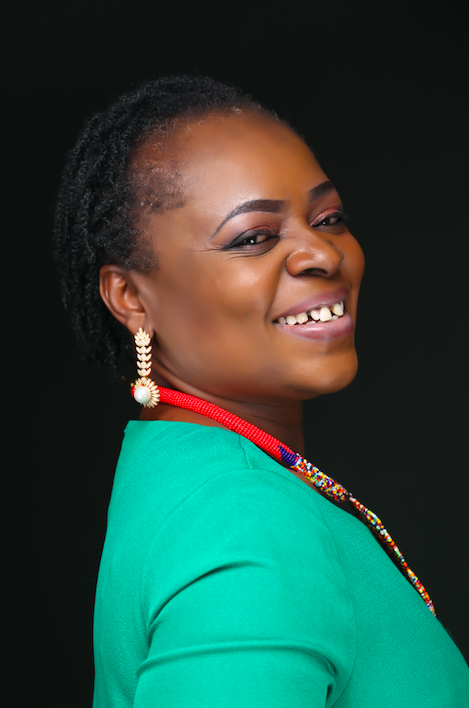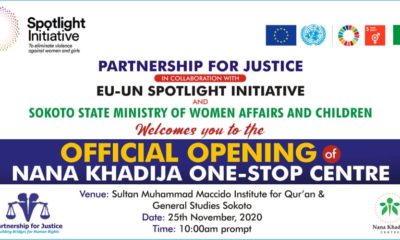Inspired
Lagos Business School NPLM Programme – The Vision of Mirabel Centre & the Founder’s Guide to Building an Effective Organization

In 2003, a young girl’s harrowing account of repeated sexual assault by a father she could not escape stressed to Itoro Eze-Anaba, the need for support services for rape survivors in Nigeria. This chance meeting may have sparked in Eze-Anaba the vision for Mirabel Centre, the country’s first sexual assault referral facility, but the realisation of that vision was and continues to be the result of her unconventional, and sometimes experimental, leadership.
Blazing trails has been an arduous but fulfilling journey for this Senior Fellow, whose frontlines work for the promotion and protection of women’s rights was also pivotal in the passage of Nigeria’s first domestic violence law. She shares with the NPLM Programme insights from her work and experience.
Many young people have a passion to effect change but not the experience or know-how. Where can they start?
The late billionaire Nelson Bunker Hunt said, “To be successful, you must decide exactly what you want to accomplish, then resolve to pay the price to get it.” Set appropriate goals by asking yourself three questions: Why are you starting the organisation? What do you want to achieve? What impact do you want to make? Your answers will translate your vision into actionable goals and objectives that address relevant issues. When working to fight human trafficking, for instance, your answers could leave you to focus on preventive measures, service provision, or laws and policies.
Before you set sail, however, learn the ropes. Begin at an existing NGO, where you’ll help implement existing goals in an effective and efficient manner. Once you have adequate experience, develop a prioritised plan for your organisation using the SMART principle: objectives must be sustainable, measurable, achievable, relevant, and time-bound.
Did you have a defined organisational structure before opening Mirabel Centre or did you figure it out along the way?
I had an idea, but it took ten years to secure funding and open Mirabel Centre. The idea underwent a lot of refining during those intervening years. I visited crisis centres in Europe and Africa, so I knew the model and the kind of people I wanted. So when we opened our doors, we had a defined structure.
How do you know who’s a good fit for your organisation?
A blind recruitment process ensures you get the best hires at the time, individuals who have the capacity to work with you towards actualising your goals. Advertise for applications that you’ll evaluate through an interview panel. There can be no nepotism. Your colleagues, as I prefer to refer to them, will then arrive independently motivated because they’re there on merit and have a job to do. I referred to those who approached me during our recruitment to our advertisement and told them the selection process, making it clear that I could only get them to the door, not through it. We assembled a capable team, but none of my referrals on the shortlist made it through. The interview panel still doesn’t know that I sent in referrals.
There are two competing perspectives on leadership: one side insists that direction and push should come from the founder, while the other argues that employees should understand and carry the vision forward themselves. What’s your approach?
The founder certainly sets the direction. Founders also set goals, objectives, and plans for every employee and these pieces fit into the larger organisation plan.
The choice, however, is between relevance and prominence: do you want your organisation to be about effecting change or do you want it to be a cult of personality? Are you building an organisation or a one-person show? Your choice determines the impact you will make.
Many founders believe that theirs should be the sole voice in the room and leave their team no space to communicate good ideas or be proactive. This severely limits your organisation. As a professional and an individual, inclusive leadership is what matters to me and it works. Don’t be the only repository of knowledge, experience, and exposure, otherwise nothing will happen when you’re not there. An organisation should flourish with or without its founder. Remember: you recruited your team and they’re your best product. Establish a feedback mechanism and a conducive environment to engender continuous dialogue. Your colleagues will tell you what works, apprise you of operational issues, and show you where change is needed. Our main and satellite offices, for instance, have separate daily staff meetings. The satellite office checks in every morning and I read their meeting minutes. At our joint meeting every third Tuesday, we analyse issues at the Centre to see what’s working and what we need to change.
Inclusive leadership also means a deliberate effort to build capacity in your team, arguably your most important responsibility as a founder because you cannot execute your mission on your own. I don’t mean compensation packages: equip your team with the training, knowledge, and resources they require to implement the organisation’s mission. Capacity building is a two-way street: it’s as much about what your colleagues get from you as it is about what you get from them. When we have meetings, for instance, we rotate roles for everyone to acquire experience drafting meeting agendas, chairing meetings, taking notes, and so on.
Investing in staff does come with risks.
Don’t be afraid to invest in staff because you think they might leave. They did, after all, come to you from elsewhere. Focus on empowering them while they’re with you and when they’re gone, you’ll be proud of what they helped you achieve.
What other tools can a founder employ to create a functioning and effective organisation?
Every organisation needs structure and you create this through processes. Because of the sensitive nature of our work, Mirabel Centre has rigidly-followed processes. A carefully charted process lays out every step from the moment a sexual violence survivor walks in until the moment they leave the Centre. Their first point of contact is critical and must be one of our counsellors, nurses, or midwives, as they’re trained to provide support to a traumatised person. It cannot be an administrative officer.
Periodic evaluations of employee performance are also crucial as are organisational assessments. Be flexible and willing to fine-tune or overhaul processes based on ground conditions. A client would sometimes arrive at the Centre when both counsellors were already engaged and would have a long wait before being assisted. She would subsequently miss the hospital’s lab hours and have to return a second day for medical tests, which could add to her trauma. My colleagues suggested at a weekly meeting that waiting clients could go for tests during the wait and I agreed but maintained the point of contact requirement.
For processes to work, your team must buy into your vision and mission, both of which must be unambiguous and easily understood by all. Strive to create an environment of trust where everyone’s priority is the collective. They must believe that their success and the success of the organisation are one and the same. When we opened our doors in 2013, I was the sole reference point for direction and information. Today, everyone has bought into the mission, so much so that my colleagues don’t really need me anymore. I now serve in a mostly supervisory capacity. They work long hours and weekends unprompted because the Centre’s goals are their goals and they are passionate about our clients.
Moreover, as your inclusive management style and capacity building bring together your organisation, your colleagues will over time regulate themselves and each other. I don’t question colleagues who need a day off or two; handling several survivors of sexual violence a day is mentally and emotionally draining, so my people sometimes need to decompress and return when at their best. In the rare instances that this latitude has been abused, my colleagues have on their own called their errant associate to order.
Conflicts must still arise. How do you resolve them?
When we have divergent views on direction, we always go back to the core question: what’s in the best interests of our client? The answer always points us to a workable solution.
How do you attract donors and other stakeholders to build a network?
You can easily create visibility and accessibility (through flyers, calling cards, social media, and traditional media), but the image that stakeholders connect with is determined by your culture and by how you differentiate your organisation. So start there. Mirabel Centre’s culture is an expression of its core values and beliefs. It determines our effectiveness and therefore informs our image. What do you want to be known for? Your attention to detail? Cutting corners?
Our wide network of stakeholders includes donors, the community, our clients, the police (with whom we work closely), colleagues, government, and the media. We are field experts to all of them and let our work speak for itself. Carve out your niche by bringing value to your field. Become the go-to experts by being consistent, transparent, genuine, and ready to answer any and all questions with evidence-based data. This will make you appealing to donors and stakeholders because expertise and consistency build trust. Questionable claims, unsubstantiated data, and inconsistency erode donor and stakeholder trust. Know your capacity, therefore, and embody your values.
You find donors and stakeholders through networking. It’s the lifeblood of the non-profit world because advocacy does not happen in a vacuum. Do your research and carefully plan donor interactions. Theirs is a close-knit community; lateness or unpreparedness at one meeting can ruin your chances with all potential donors. Also, be strategic and prioritise donors. Understand and know how to navigate the dynamics and politics of a donor’s organisation.
Don’t just be out there to be seen, though; define the impact you want to make and carefully plan each networking opportunity to include your team. I’m not the only face of Mirabel Centre; colleagues who thoroughly understand our mission and can effectively represent the organisation also handle media appearances, meetings, conferences, training, and other events. Having the same executive officers at every event is indicative of a lack of capacity building and trust. Capitalise on your team to maximise visibility, effectiveness, and reach.
Each stakeholder requires a separate strategy. Some partners may require you to think laterally. One would, for instance, assume we work primarily with the Ministry of Health, but the goals of the Ministry of Justice were more aligned with ours; MOJ wants to end impunity and bring perpetrators of sexual violence to justice, so to them, our counselling and treatment services put survivors in a better position to seek justice.
Media relationships are also essential and we are firm and consistent when dealing with the media. Our media partners know what they can get from us and we never violate client confidentiality.
Ultimately, our clients are our first priority. Their best interests directly determine our processes and drive us to be agents for change. You must, therefore, be mission-driven, not donor- or stakeholder-driven. I got a lot of pressure in the early days to go the way of numerous other NGOs into the HIV/AIDs subsector because of its wealth of treatment and prevention funding, but we were clear on our mission. Be genuine and honest and don’t capitulate.
Finally, what are your biggest challenges in running Mirabel Centre?
Funding remains a constant challenge. Our services are free, so managing our substantial costs can be an uphill battle. Depending on your field, funding could be your biggest challenge.
Working with stakeholders can also be taxing. You may often encounter a lack of awareness or understanding by parties who may not share your vision, principles, or values.
At the end of the day, it’s up to you to know what you want to accomplish and what price you’re willing to pay. You alone can decide.
———————————————————————————————————————————————————————————–Sponsored Content






















